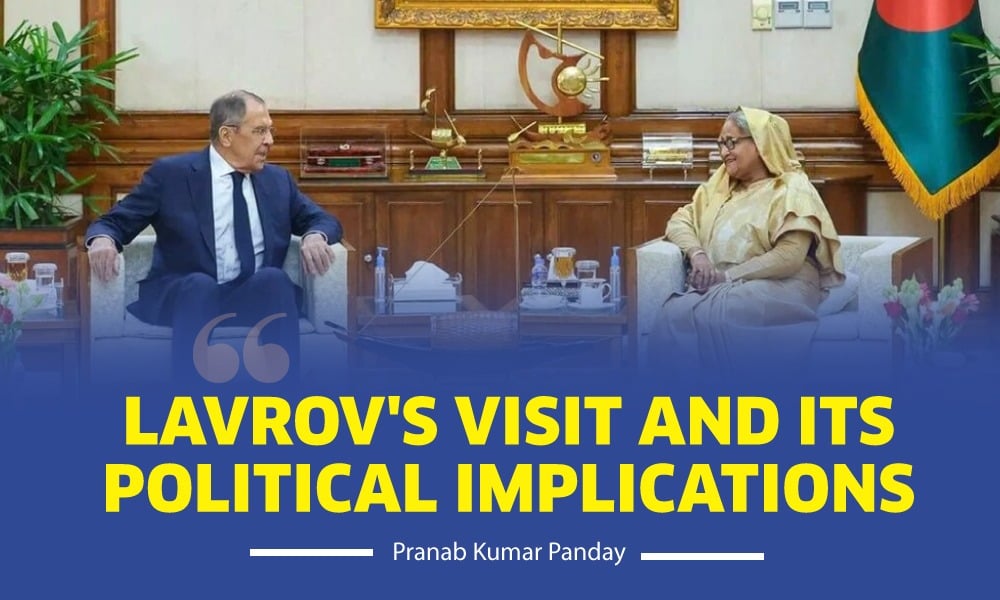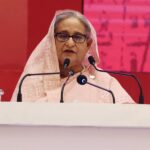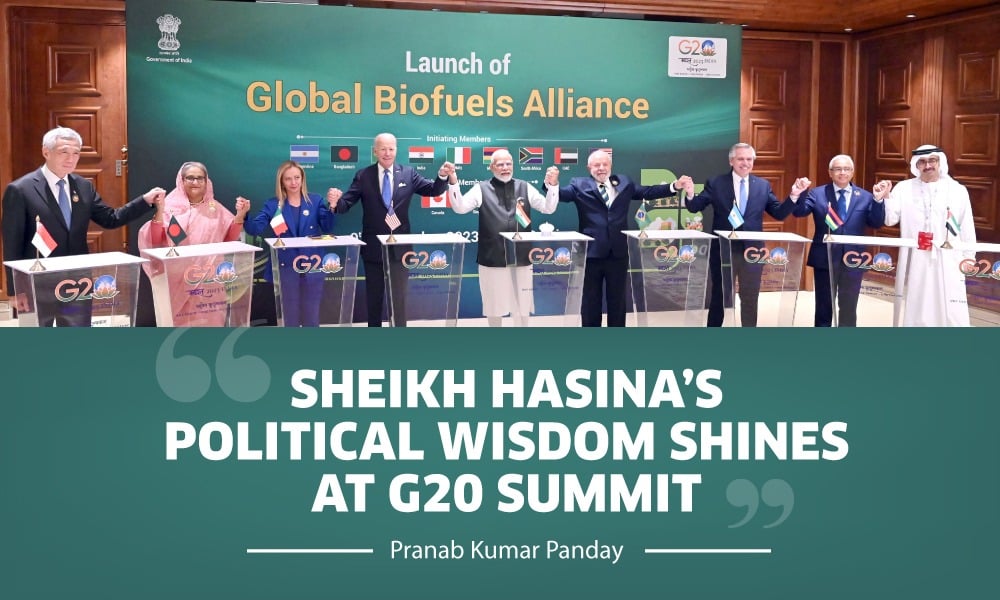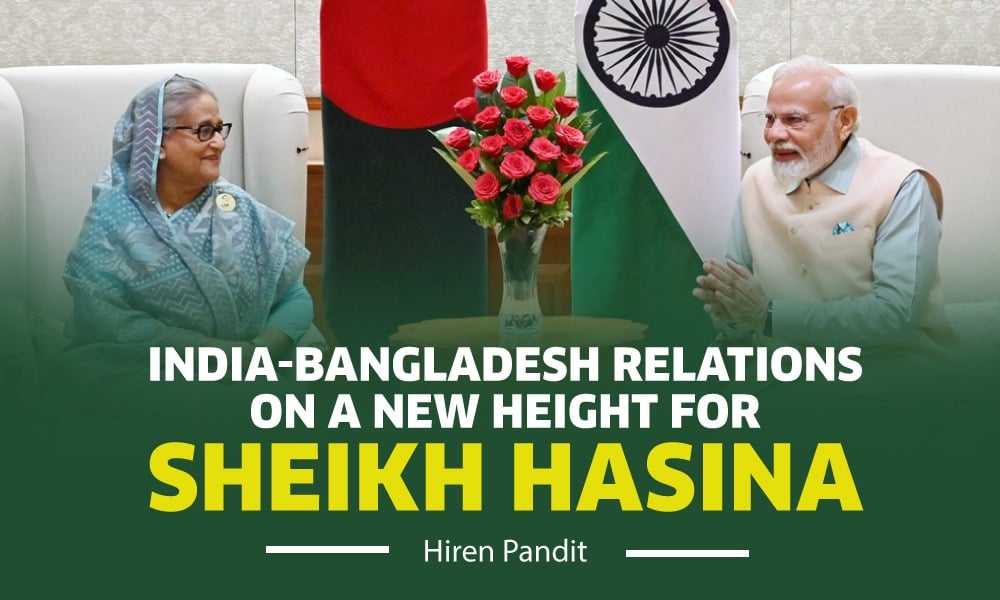Dr. Pranab Kumar Panday:
The recent visit by Russian Foreign Minister Sergey Lavrov to Bangladesh has stirred significant interest and speculation within political circles. This heightened attention is particularly noteworthy as it aligns with the critical period leading up to the impending national elections in the nation.
This visit carries exceptional significance as it marks the inaugural visit by a Russian foreign minister to Bangladesh since the establishment of bilateral relations in 1971, a pivotal period in history during Bangladesh’s War of Independence.
Therefore, Lavrov’s visit carries significant implications for Bangladesh’s political landscape and foreign policy.
The visit of a high-ranking Russian diplomat at this juncture reflects the growing importance of the bilateral relationship between Russia and Bangladesh. Both nations have been working to strengthen their diplomatic ties in recent years, especially in areas such as trade, defense, and energy cooperation. Lavrov’s visit is seen as a continuation of these efforts and is expected to further solidify the Russo-Bangladeshi partnership.
One key aspect of Lavrov’s visit is the potential for discussions on economic cooperation. Russia has expressed interest in enhancing trade relations with Bangladesh, which could have a positive impact on the country’s economy.
This could be particularly advantageous for the ruling party, the Awami League, as it gears up for the elections. The ability to showcase improved economic ties with a global power like Russia could bolster their electoral prospects.
Nevertheless, the timing of Lavrov’s visit might raise concerns among opposition parties, who are actively advocating for the resignation of the ruling government and the organization of national elections under a caretaker government, even though the current constitutional provisions do not align with their demands.
Consequently, some factions within the opposition and government critics argue that the ruling party could potentially utilize this visit to their advantage, leveraging it as a platform to showcase their achievements in foreign policy and bolster their electoral prospects.
Furthermore, Lavrov’s discussions with Bangladeshi officials may touch upon regional and international issues, including Bangladesh’s stance on global conflicts. The outcome of these discussions could have ramifications for Bangladesh’s foreign policy direction and its relationship with other countries in the region, including neighbouring India.
During his recent working visit to Bangladesh, Foreign Minister Sergey Lavrov engaged in significant diplomatic discussions. His meetings with Prime Minister Sheikh Hasina and Bangladeshi Foreign Minister AK Abdul Momen were marked by discussions on the current state of bilateral relations and their potential for further growth.
Both sides expressed a strong commitment to maintaining a robust political dialogue and expanding mutually advantageous trade and economic collaboration.
Additionally, Lavrov and his Bangladeshi counterparts commended the positive track record of interaction between their countries within the United Nations and other multilateral organizations, highlighting the depth of their diplomatic engagement on the global stage.
This visit underscores the shared desire of Russia and Bangladesh to strengthen their ties across various spheres, promoting cooperation and diplomatic solidarity.
The visit takes on added significance in the context of the ongoing rivalry between the United States and Russia on the global stage. As the two superpowers continue to vie for influence in various regions, including South Asia, every diplomatic move and engagement becomes a potential battleground for strategic competition.
For the United States, Lavrov’s visit represents Russia’s effort to strengthen its presence and partnerships in a region. Consequently, the US may closely scrutinize the outcomes and agreements stemming from this visit, particularly in relation to issues such as economic cooperation, defense ties, and political stability.
This rivalry underscores the geopolitical complexities at play during Lavrov’s visit to Bangladesh and highlights the broader struggle for influence between the world’s major powers in the region.
Bangladesh stands to gain several potential advantages from the visit. First and foremost, this visit signifies Russia’s growing interest in deepening its diplomatic and economic ties with Bangladesh, which could open up new avenues for trade, investment, and technological cooperation.
Enhanced economic relations could stimulate growth and job opportunities in Bangladesh, which is crucial for its burgeoning economy. Additionally, improved defense cooperation with Russia might bolster Bangladesh’s national security, providing access to advanced military technology and strengthening its defense capabilities.
Moreover, the visit could raise Bangladesh’s international profile and potentially attract more foreign investments, given Russia’s global influence. Overall, Lavrov’s visit holds the promise of fostering beneficial partnerships and bolstering Bangladesh’s position on the international stage.
The visit allows the Awami League to showcase its diplomatic successes and strengthen economic ties with a global power like Russia, which could be portrayed as a positive development for the country. This can provide the party with a narrative of effective governance and international engagement.
In summary, Russian Foreign Minister Sergey Lavrov’s visit to Bangladesh is a significant diplomatic event with potential political consequences in the face of upcoming parliamentary elections to be held in early 2024.
It offers opportunities for economic cooperation and strengthens bilateral ties. Additionally, it will provide a morale boost for the government in the face of pressure from the opposition and their international allies to reinstate the caretaker government.
Writer: Professor, Department of Public Administration at the University of Rajshahi.
Courtesy: Dhaka Tribune






